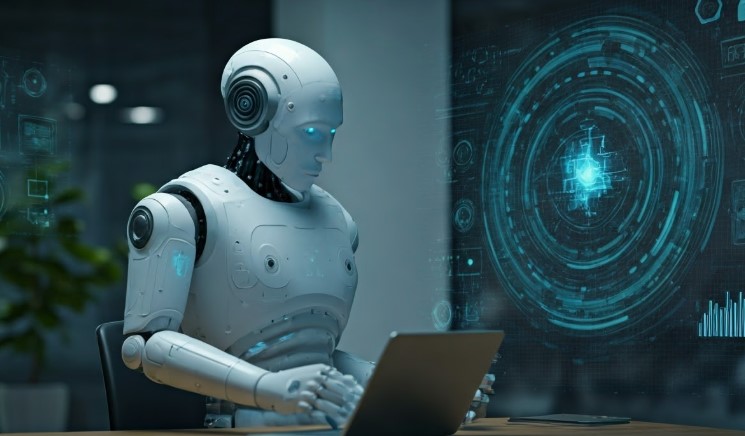
Unveiling AI Predictions 2025: Humanoids and AI Agents

Key Highlights
- AI agents will revolutionize industries, automating tasks, and augmenting human capabilities.
- Expect significant advancements in AI-powered personalization, with highly tailored user experiences across diverse platforms.
- The use of artificial intelligence in healthcare will lead to more efficient systems, quicker and more accurate diagnosis, and highly personalized treatment.
- As AI advances, expect more stringent ethical AI regulations to emerge, prioritizing fairness, transparency, and accountability in AI development.
- AI will reshape education by enabling personalized learning platforms and AI-driven assessments for tailored educational experiences.
Introduction
The pace of innovation in artificial intelligence (AI) is staggering, transforming industries and pushing the boundaries of what's possible. Generative AI, with its ability to learn patterns and create new content, is at the forefront of this revolution. This blog explores the transformative potential of AI, focusing on the rise of humanoids and AI agents and their profound impact on businesses, work, and society.
The Evolution of AI and Its Impact on Society
From its early beginnings in symbolic AI to the recent breakthroughs in deep learning, artificial intelligence has come a long way. This remarkable journey has been punctuated by periods of rapid progress, followed by phases of slower growth, often called "AI winters." Nevertheless, AI has persevered, fueled by advancements in computing power, the availability of massive datasets, and groundbreaking research.
Today, AI is no longer confined to research labs; it's deeply embedded in our daily lives. The algorithms behind recommendation systems, spam filters, and voice assistants are a testament to AI's pervasive influence. As AI continues to evolve at an unprecedented rate, we can expect even more profound implications for society.
How AI Has Transformed Industries and Daily Life
AI's transformative touch is evident across industries, revolutionizing operations and reshaping business models. In manufacturing, AI-powered systems optimize supply chains, predict maintenance needs, and enhance production efficiency. The financial services industry leverages the impact of AI for fraud detection, algorithmic trading, and personalized financial advice.
Moreover, AI is changing how we experience the world around us. Autonomous vehicles are poised to revolutionize transportation, promising increased safety and efficiency. Customer experiences are becoming increasingly personalized as AI-powered chatbots and virtual assistants provide tailored recommendations and support.
As AI matures, its impact on our daily lives will only become more pronounced, leading to more convenient, efficient, and personalized experiences.
Predicting the Next Big Leap: AI in 2025
By 2025, we can anticipate significant advancements in AI, driven by rapid advances in machine learning and generative AI breakthroughs. These advancements will fuel a new wave of AI applications and use cases, further blurring the line between the physical and digital worlds.
Generative AI, with its ability to create new content, designs, and solutions, will reshape industries like product design, entertainment, and marketing. Imagine GenAI tools and AI generating personalized advertising campaigns, composing original music, or designing innovative products based on specific requirements.
The convergence of AI with other emerging technologies like the Internet of Things (IoT) and extended reality will unlock a new realm of possibilities across various fields. As we stand on the cusp of this AI-powered future, the potential for innovation and disruption is boundless.
The Rise of Humanoids and AI Agents
The advent of humanoids and AI agents represents a significant leap in AI. These sophisticated entities go beyond simple automation, showcasing an ability to learn, adapt, and interact with the physical world in increasingly human-like ways. As their capabilities grow, humanoids and AI agents will play an increasingly important role in various aspects of our lives.
Imagine a future where humanoids assist with household chores, provide companionship, or work alongside humans in industrial settings. AI agents will become indispensable in customer service, offering personalized support and streamlining complex tasks. This fusion of AI with robotics marks a pivotal moment in technological evolution, ushering in a new era of human-machine collaboration.
Understanding Humanoids: Capabilities and Ethics
Humanoids, with their ability to mimic human movements and interact with the physical world, present both incredible opportunities and complex ethical dilemmas. As these sophisticated machines take on more responsibilities, ensuring responsible development and deployment is paramount in the context of simulation technologies.
Central to this endeavor is establishing clear ethical practices that govern the design, development, and use of humanoids. Human oversight will remain critical to prevent unintended consequences and ensure alignment with human values. Striking a balance between technological advancements and ethical considerations will be crucial to guiding their integration into society responsibly.
The potential benefits of humanoids are vast. From assisting with dangerous or physically demanding tasks to providing companionship and care, humanoids could significantly enhance our lives. By embracing ethical practices and maintaining human oversight, we can unlock new heights of progress while mitigating potential risks.
AI Agents: Revolutionizing Customer Service and Beyond
AI agents are transforming how businesses interact with customers, offering a level of personalization and efficiency previously unimaginable. These intelligent agents excel at handling routine inquiries, effectively managing various knowledge bases, and freeing up human agents to address more complex issues. This shift allows companies to enhance customer satisfaction while optimizing their workforce.
Here are a few ways AI agents are revolutionizing customer service and beyond:
- Personalization: AI agents can analyze customer data to deliver personalized experiences, anticipating needs, and offering relevant solutions.
- 24/7 Availability: Unlike human agents, AI agents are available round-the-clock, providing instant support and resolution to customer inquiries.
- Scalability and Cost-Effectiveness: AI agents can handle a high volume of interactions simultaneously, making them a cost-effective solution for managing customer service at scale.
Furthermore, AI agents' capabilities extend beyond customer service. They can automate tasks like scheduling appointments, booking travel arrangements, or even providing personalized financial advice. As AI agents become more sophisticated, their integration into various business functions will lead to increased efficiency, reduced costs, and improved customer experiences.
The Influence of AI on Job Markets and Education
The rapid advancements in AI are poised to reshape the job market, demanding a shift in skills and presenting both challenges and opportunities. While AI may automate some existing roles, it will also create new ones, particularly in fields related to software development, AI development, data analytics, and AI system management.
To prepare for this evolving landscape, education systems must adapt to equip individuals with the skills needed to thrive in an AI-driven world. This includes a greater emphasis on STEM education, critical thinking, creativity, and adaptability, ensuring the workforce is equipped to navigate the changing demands of the job market.
AI's Role in Creating New Job Opportunities
While the prospect of AI-driven automation causing job displacement is a valid concern, it's essential to recognize that AI's transformative influence and the need for validation will also create new employment opportunities. As AI becomes more sophisticated, the demand for skilled professionals who can build, deploy, and manage these complex systems will continue to rise.
Tech companies at the forefront of AI development are already investing heavily in expanding their workforce, seeking data scientists, machine learning engineers, and AI ethicists to handle sensitive data. This surge in demand for AI talent extends beyond the tech sector, with industries like finance, healthcare, and manufacturing actively seeking professionals with AI expertise.
The emergence of new business models driven by AI will further fuel job creation. From AI-powered personalized services to autonomous vehicle operations, these new ventures will require skilled individuals to build, manage, and maintain these innovative systems, including proprietary data utilization. As AI continues to reshape the business landscape, the ability to adapt and acquire AI-related skills will be crucial for individuals seeking to thrive in this dynamic job market.
Transforming Education Through AI Learning Platforms
AI's impact on education extends beyond preparing students for AI-related jobs. AI applications can transform the learning experience itself, making it more personalized, engaging, and effective. AI-powered learning platforms can tailor educational content to individual student needs, providing personalized recommendations, and pacing lessons to match their learning style.
Here's a glimpse into how AI is transforming education:
AI Application
Benefits in Education
Personalized Learning Platforms
Provide customized learning paths, adapt to individual student needs, and offer personalized feedback.
Intelligent Tutoring Systems
Offer real-time guidance, answer questions, and provide personalized support to enhance student learning.
AI-Driven Assessments
Provide insights into student understanding, identify learning gaps, and enable educators to tailor instruction effectively.
Moreover, AI can assist educators by automating administrative tasks, grading assignments, and providing data-driven insights into student performance. This allows teachers to focus more on instruction, mentorship, and creating engaging learning experiences. By embracing AI, we can create a more equitable and effective education system that empowers students to reach their full potential.
KeywordSearch: SuperCharge Your Ad Audiences with AI
KeywordSearch has an AI Audience builder that helps you create the best ad audiences for YouTube & Google ads in seconds. In a just a few clicks, our AI algorithm analyzes your business, audience data, uncovers hidden patterns, and identifies the most relevant and high-performing audiences for your Google & YouTube Ad campaigns.
You can also use KeywordSearch to Discover the Best Keywords to rank your YouTube Videos, Websites with SEO & Even Discover Keywords for Google & YouTube Ads.
If you’re looking to SuperCharge Your Ad Audiences with AI - Sign up for KeywordSearch.com for a 5 Day Free Trial Today!
Conclusion
In conclusion, the rise of AI and the integration of humanoids and AI agents in various sectors are shaping the future landscape of technology and society. It's evident that AI's impact on job markets, customer service, education, and daily life is substantial and continues to evolve. As we anticipate the advancements in AI by 2025, understanding the capabilities and ethical considerations surrounding humanoids and AI agents becomes crucial. The transformative potential of AI in creating new job opportunities and enhancing educational platforms underscores the importance of embracing innovation while also addressing the challenges it may pose. Stay informed and prepared for the exciting developments that AI predictions hold for the near future.
Frequently Asked Questions
How Will Humanoids Change the Way We Work?
Humanoids, incorporating advanced robotics, will reshape our work lives by taking over repetitive daily tasks and automating intricate workflows to better interact with the real world. This shift will lighten workloads, allowing humans to focus on creative and strategic endeavors, fundamentally changing how we approach work.
Can AI Agents Truly Understand Human Emotions?
While AI agents can process natural language and analyze unstructured data, achieving true emotional intelligence remains a complex challenge. Their strength lies in responding empathetically based on learned patterns in customer interactions, enhancing the overall customer experience.
